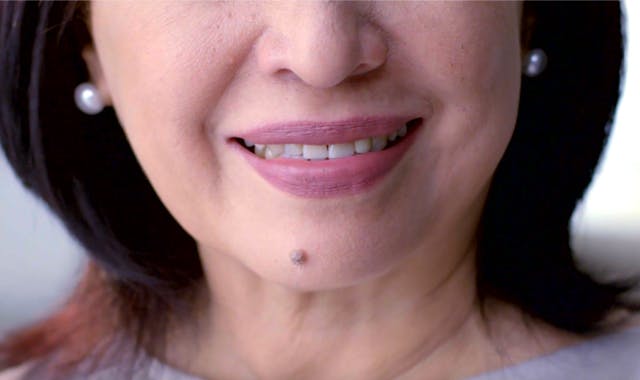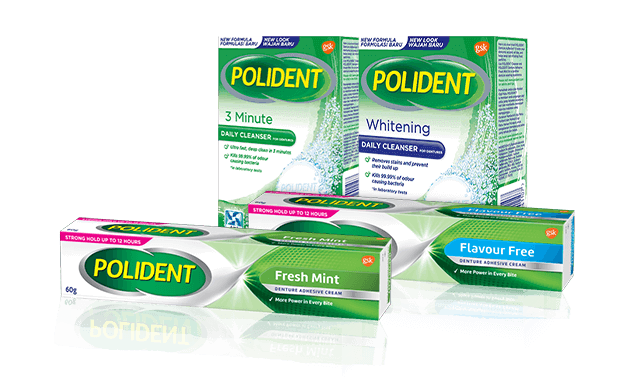General questions
Denture Cleanser Tablets
-
1. What is the best way to clean dentures?
Caring for your denture is as important as caring for natural teeth. Regular toothpastes used on natural teeth may not be suitable for dentures as they may scratch the denture surface. Dentures need cleaning daily, and because they are different from natural teeth, they require specialist methods, like a denture cleanser, which are designed to effectively kill bacteria and reduce plaque and stain build up when used as directed.
-
2. How do I use Polident denture cleansers?
- Drop one Polident Cleanser tablet into enough very warm (not hot) water to cover denture for the time stated on the pack instructions.
- After soaking for 3-5 minutes with the denture cleansing tablets, brush denture with the solution using a soft brush.
- Rinse denture well with running water. Discard solution immediately after use.
-
3. Is there a limit to how long dentures can be left in the Polident solution?
-
4. How do Polident denture cleansers work?
When used as directed, the multi-ingredient cleaning system in Polident helps clean dentures by removing plaque and stains and killing Odour causing bacteria and Bacteria. The oxidants (Potassium Caroate and Sodium Carbonate Peroxide) in the formulation are bleaches and work to remove the stains that can build up each day. They are also effective in killing the bacteria and other microbes that are harboured by your dentures.
The detergent (Sodium lauryl sulfoacetate) will clean dentures by helping to lift the stain debris from the surface. The effervescent ingredients (sodium bicarbonate and citric acid) help to breakdown the tablet and disperse the above ingredients so they can get to work cleaning your denture. These actions are helped by brushing your dentures with the solution after soaking.
-
5. How often can I use Polident cleanser?
-
6. Can I use more or less Polident denture cleaning tablets than recommended?
-
7. Can I use Polident soaking solution multiple times for cleaning the dentures?
-
8. Should I use 1 tablet per denture (upper and lower) or 1 tablet per all the dentures I have?
-
9. Why is it important to use Polident every day?
A daily denture cleaning regime is essential to maintain good denture hygiene.
Once a denture is placed in the mouth, plaque, stains and bacteria start to build up.
Polident is specifically formulated for removing plaque and stains without damaging the denture*. It also has proven bactericidal activity, killing 99.9% of odour causing bacteria*.We recommend soaking daily with Polident denture cleanser followed by brushing with the solution and a thorough rinse under running water.
*when used as directed
-
10. Why should I use Polident tablets instead of regular toothpaste? Is it better than regular toothpaste?
Regular toothpastes contain abrasives that help clean natural teeth primarily through mechanical action. As you know the acrylic used in dentures is softer than natural enamel. Therefore abrasives in toothpaste can scratch the denture surface, helping to create the ideal conditions for growth of malodour bacteria.
Polident unique denture cleanser tablet formulations are non abrasive, specifically designed to be gentle on dentures but hard on bacteria. -
11. Can Polident denture cleanser products be used with orthodontic appliances?
-
12. I’ve noticed flecks in the Polident solution. Is that normal?
Denture Adhesive
-
1. How do I use Polident denture adhesive?
- Clean and dry your dentures
- Apply Polident adhesive as directed on pack in short strips not too close to the denture edges
- Rinse mouth before inserting dentures
- Press dentures into place, hold firmly and bite down for a few seconds to secure
- When using for the first time, apply a small amount of adhesive. It may take a few attempts to find the right amount for your denture. Wait several minutes before eating or drinking. Always follow the instructions on the pack.
-
2. Can I use denture adhesives regularly?
Polident denture adhesives has a long established efficacy profile when used according to label directions. Millions of people regularly use Haleon adhesives which is generally well tolerated when used as directed. Consumers are advised to visit their dentist regularly to ensure correct denture fit.
-
3. Is there a limit to the amount of denture adhesive that I can use in a day?
-
4. What would happen if I ingest some of the adhesive?
Swallowing small amounts of this product, when used as directed, may occur and is not known to be harmful. Denture adhesive is generally well tolerated and has a long established safety profile. Haleon employs a routine, pro-active process for identifying safety signals and always recommends using the product as instructed.
Ingestion of large amount of denture adhesive should be avoided. We always recommend using any Haleon product as described in the product label.
-
5. Why do I sometimes experience oozing when using Polident denture adhesive?
When you experience oozing of denture adhesive cream from beneath dentures, it's a sign that you’re using too much. If oozing occurs, reduce the amount of denture adhesive that you are applying. Remember, Polident denture adhesive holds all day, so you should not need to apply it more than once a day.
-
6. How long does Polident denture adhesive hold?
Our formulation provides an effective all-day hold for well-fitting dentures (up to 12 hours) — depending upon the individual, the fit of the denture, and the amount of saliva in the mouth and the foods and beverages that are consumed. Visit your dentist regularly. Ill-fitting dentures may impair your health.
-
7. How do Polident denture adhesives work?
Polident adhesives have demonstrated in clinical studies to provide consumers with benefits of all day hold and sealing out food particles. Physical retention of the dentures occurs when the adhesive swells in the presence of moisture (saliva) and excludes the air from between the denture and tissue surface. Voids between the denture and gums are reduced, giving the patient greater confidence to bite harder and eat a healthy varied diet
-
8. How does Polident denture adhesive seal out food?
-
9. How do I remove the adhesive from my mouth and dentures?
You should swish your mouth with warm water and then take the dentures out slowly using rocking motions.
To remove adhesive residue from dentures, soak in a Polident denture cleanser as per label instructions and brush any remaining adhesive from the denture.
To remove adhesive residue from the mouth, brush the roof of the mouth and gums with a toothbrush, and warm water.
-
10. Is Polident adhesive safe to be used by pregnant women?
-
11. Do Haleon Denture products contain zinc?
At Haleon, consumer safety is our primary concern. As a precautionary measure, Haleon voluntarily stopped the manufacture, distribution and advertising of all zinc-containing denture adhesives in February 2010.
Our denture adhesives that contained zinc have always been safe and effective when used as directed. The vast majority of consumers did follow the instructions on the package. However we know that some used excess product over the long term, and this is associated with potential health risks. This is the reason why we took this decision and introduced a zinc-free line of denture adhesives.
Haleon-manufactured denture adhesive cream no longer contains zinc and all are labeled Zinc Free.
-
12. Do Haleon Oral Health products contain triclosan?
Triclosan is a chemical with antibacterial properties that has been widely used for over 30 years in consumer products such as detergents, soaps, skin cleansers, deodorants, lotions, creams, toothpastes, and oral health care products. Scientific and public opinion is divided as to the safety profile of triclosan.
In 2008, Haleon Consumer Healthcare took the decision to remove triclosan from its oral care products, worldwide. Triclosan was removed from all oral care products, by January 2013.
Haleon Oral Care products were reformulated without triclosan and offer consumers the same core product benefits.
*in laboratory tests
POLIDENT is a registered trade mark of the Haleon group of companies






